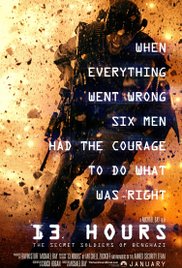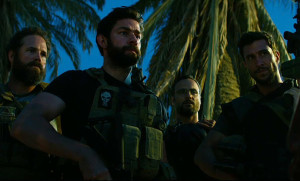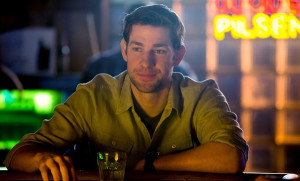 It’s cliché to say a movie transported you into the story, but I can honestly say that was my experience with 13 Hours: The Secret Soldiers of Benghazi. From the very beginning, this movie is something different. 13 Hours is a realistic combat film with a significant amount of language and graphic violence, it is not a movie for the faint of heart. However, it does offer a lot cinematically and story-wise. While watching the movie it just felt beyond real.
It’s cliché to say a movie transported you into the story, but I can honestly say that was my experience with 13 Hours: The Secret Soldiers of Benghazi. From the very beginning, this movie is something different. 13 Hours is a realistic combat film with a significant amount of language and graphic violence, it is not a movie for the faint of heart. However, it does offer a lot cinematically and story-wise. While watching the movie it just felt beyond real.
One of the reasons I wanted to see this movie was, while the topic was widely covered in the news, especially in political news, like most things in the media, we didn’t get to know a lot of the details. I wanted to see 13 Hours because I wanted to know the story behind the story and, on that front, the movie did not disappoint. The story is intense and focused. There are not three or four story lines to keep track of, just one (even though at times you don’t know exactly what is going on, but that may mimic the real life story).
The film is set in Benghazi, Libya and tells the story of what happened just before and including the events there on September 11, 2012. Enter Jack Silva, a paid contractor working with the CIA to provide security for the CIA’s non-disclosed station in Benghazi and for the ambassador in the nearby outpost. We’re not really sure why the CIA is there, something about stopping the flow of weapons and Ambassador Stevens is there to win hearts and minds.
In the beginning, we see a lot of back and forth between the CIA and the ex-military men working as security contractors. The movie is based on the true story, but like any movie, it can be hard to know what is “Hollywood” and what is real, and even so, the real story is always going to be just a version of the truth, from one or more person’s perspective. The contractors are concerned with doing what’s practical; to stay safe. Meanwhile, the CIA station chief wants to engage in highbrow tradecraft and otherwise stay out of trouble. Of course this ultimately leads to big trouble.
 The film then humanizes several of the security contractors by letting us in on their personal lives. They all have wives and some have young kids, and we even get glimpses of how some of them came to be in Benghazi. As we learn to care about the men, all of whom are rocking serious beards, (which makes it hard to follow who’s who at times) we discover that security is lax due to budget constraints, and at times unreliable locals who are supposed to be not just helping but taking the lead on security. Though, we also see one local who heroically stays with the Americans to help them, despite the dangers.
The film then humanizes several of the security contractors by letting us in on their personal lives. They all have wives and some have young kids, and we even get glimpses of how some of them came to be in Benghazi. As we learn to care about the men, all of whom are rocking serious beards, (which makes it hard to follow who’s who at times) we discover that security is lax due to budget constraints, and at times unreliable locals who are supposed to be not just helping but taking the lead on security. Though, we also see one local who heroically stays with the Americans to help them, despite the dangers.
On September 11th however, things quickly spiral out of control as the ambassador’s compound comes under attack. The rest of the movie has the Americans trying to get to the ambassador, stay alive, and not let the CIA compound, with all of the Americans, be overrun by terrorists.
The overwhelming feeling you get watching this movie is just how abandoned these men are– some even to death. As terrible a feeling as this is, I have to think of how Jesus was abandoned by his followers, right up to and including his death. But with Jesus there is a happy ending, because he overcomes death. In this movie a happy ending doesn’t seem to be coming.
There’s two lines that stood out in the movie that really said something to me. The first comes when the contractors defy orders to go rescue the ambassador (despite not being cleared to do so). One of the characters says something about losing their job or something similar (it’s a little hard to follow at times), but Jack’s response is what counts. He says, “You can’t put a price on ‘living with yourself’.” This is so true, we have to live with the decisions we make and this is more important than just doing your job or following orders. Doing the right thing for the right reason in the face of real danger, and defying orders to do the right thing, is truly heroic. The other line comes near the end of the movie when the contractors are talking about how the military and CIA members will get medals for what they did, and one contractor asks “What do we get?” and Jack replies “We get to go home.” In the end, Jack realizes what is important: it’s not that the others don’t deserve medals or that they should be jealous, but that they have another chance to live a life with the ones they love and all while having done the right thing.
 I went into this movie knowing that four Americans died in the incident, but other than the ambassador I wasn’t really sure of who else died. It kept me wondering, “Could a movie like this have a positive ending without giving too much away?” Fortunately, I can say that it does have a somewhat uplifting ending, despite everything that transpired. The language and the very realistic graphic violence in the film made it hard to watch at times and difficult to recommend. However, the story itself is one of heroism and inspiration. I think Americans deserve to know what happened in Libya and to know the kind of character that these real people showed in real life, in service to their country and to their fellow Americans. These men didn’t just care about other Americans; they cared about all the other people. They didn’t indiscriminately shoot everyone; they were constantly trying to avoid harming other innocent people, even when doing so endangered them. In spite of the fact that this movie is filled with death, it is juxtaposed by a feeling that life, and what we do with it, is precious.
I went into this movie knowing that four Americans died in the incident, but other than the ambassador I wasn’t really sure of who else died. It kept me wondering, “Could a movie like this have a positive ending without giving too much away?” Fortunately, I can say that it does have a somewhat uplifting ending, despite everything that transpired. The language and the very realistic graphic violence in the film made it hard to watch at times and difficult to recommend. However, the story itself is one of heroism and inspiration. I think Americans deserve to know what happened in Libya and to know the kind of character that these real people showed in real life, in service to their country and to their fellow Americans. These men didn’t just care about other Americans; they cared about all the other people. They didn’t indiscriminately shoot everyone; they were constantly trying to avoid harming other innocent people, even when doing so endangered them. In spite of the fact that this movie is filled with death, it is juxtaposed by a feeling that life, and what we do with it, is precious.

